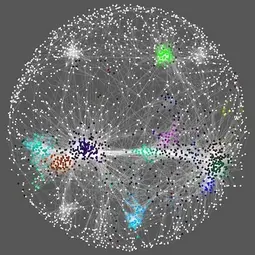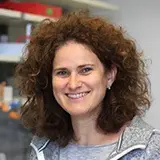Signaling and Functional Genomics
- Functional and Structural Genomics

Prof. Dr. Michael Boutros
Head of Division
Cellular signaling networks control key decisions during development, health and disease. We develop and apply functional genomic approaches to analyze the underlying context-dependent molecular mechanisms. Main goals are to better understand aberrant signaling in colorectal cancer and the Wnt signaling pathway using models such as the fruit fly and human organoids.
Image: A global network of profile similarities to understand complex gene regulatory networks. Heigwer et al., 2023, Cell Systems © dkfz.de,

Image: A global network of profile similarities to understand complex gene regulatory networks. Heigwer et al., 2023, Cell Systems © dkfz.de,
Our Research
We are interested in systematically dissecting signaling networks implicated in tumorigenesis and organismal development. During development and homeostasis, cells constantly receive signals that determine whether they divide, differentiate or die. Inappropriate control of signaling has been linked with many diseases and is frequently associated with cancer. We study principle mechanisms of signaling networks and how they are dysregulated in cancer by genetic and functional genomic approaches combined with computational technologies. A particular focus is on Wnt and interacting signaling networks that are essential during organismal development and are frequently deregulated in tumors. Our division uses model organisms from Drosophila to mouse, human cancer cells and in collaboration with clinical collaborators, ex vivo patient-derived organoid models for colorectal cancer. A focus of our organismal research has been on intestinal homeostasis and genetic as well as chemo-genetic interactions within tumors. We systematically analyse genotype-phenotype relationships using single-cell, high-content imaging and multi-omic approaches. We develop genomic technologies required for high-throughput screening using RNAi and small molecule perturbations, genome engineering by CRISPR/Cas, and novel approaches for data integration to systematically assess the functional impact of genetic alterations.
Current Research Interests
Wnt signaling is an evolutionarily conserved signal transduction route that plays key roles during development, stem cell maintenance and human diseases. Aberrant activation of Wnt signaling has been linked to, for example, the development of colorectal cancer. Mutations that inactivate the APC tumour suppressor gene are found in 80-90% of all colon cancers. We work on identifying and characterizing novel Wnt pathway components using genetic and genomic approaches in order to understand how Wnt signaling is regulated under normal and pathophysiological conditions. In the past years, a particular focus of our studies has been on systematic screening approaches, novel routes how Wnt proteins are secreted and how signals are transmitted at the plasma membrane. After our discovery of Evi/Wntless as the dedicated Wnt cargo-protein that is essential for exporting Wnt from the ER to the plasma membrane, we identified further novel factors required for proper Wnt secretion and loading of Wnt family proteins onto extracellular vesicles. We described a novel role of Wnt signaling in genome stability of stem cells and characterized the role of ERAD-dependent protein quality control for the export of Wnt ligands. Recently we uncovered that MEK inhibitors activate Wnt signaling and induce stem cell plasticity in colorectal cancer. In another study based on multi-omic analysis and CRISPR screening, we showed that the effect of Wnt signaling activation is dependent on the baseline metabolic state of a cell and thereby exemplifies context-dependency in genetic networks.
In Heidelberg, we have built an interdisciplinary network of Wnt researchers that has resulted in the establishment of the Collaborative Research Center 1234 on "Mechanisms and Functions of Wnt signaling".
Links & Downloads
Genes display epistatic (genetic) interactions, whereby the presence of one genetic variant can mask, alleviate or amplify the phenotypic effect of other variants. Genetic interactions have been shown to have profound effects during normal development and in disease. Two genes show a genetic interaction if the phenotype of allele combinations (or double perturbations) is different from the expected combination of the individual phenotypes. Genetic interactions occur, for example, when a cellular process is controlled by two parallel pathways: loss of gene products in one pathway are buffered, and only when the both pathways are disturbed, a phenotype is observed. We develop and apply genomic technologies that enable us to identify genetic and chemo-genetic interactions in metazoan cells and human organoids. Building on this, we are generating comprehensive functional maps of cellular processes in order to understand epistatic interactions in tissues, tumorigenesis and therapy response.
We integrated and analyzed data from CRISPR-Cas9 screens in human cancer cells combining functional data with information on genetic variants to explore gene-background relationships. Clustering of genes by the similarity of their interaction profiles demonstrated that these profiles are informative predictors of functional gene similarity. In another study, we analyzed the directionality and plasticity of genetic interaction networks, generating increasingly comprehensive interaction maps of focused gene sets in cell culture. We could show that integrating both morphological and genetic interaction profiles adds precision in predicting gene functions and previously undescribed regulators of known biological processes. Building on this, in an ERC Synergy project, we are investigating genetic and chemo-genetic dependencies using single cell, high content imaging and co-perturbations.
Links & Downloads
We develop technologies for high-throughput screening in cultured cells and bioinformatic methods to analyze large phenotypic data sets, including the development of miniaturized assay formats, new approaches for massively parallel perturbation analysis and phenotyping by deep-sequencing. This includes the development of novel CRISPR and RNAi libraries, new image-based phenotyping assays and combinatorial approaches for genetic and small molecule perturbations. We also develop new computational tools for the analysis and visualization of high-throughput screens and integrative analysis of screening results, including algorithms and software applications to identify RNAi and CRISPR-Cas9 reagents and predict off-target effects. Novel experimental approaches using CRISPR-Cas9 mediated genome-engineering enabled us to study the effect of genetic variants on cellular signaling.
During the past years, we developed and applied novel approaches to identify genetic interactions in metazoan cells. We were particularly interested in uncovering genetic dependencies in healthy and cancer cells by creating maps of complex genetic interactions. Furthermore, we have developed a range of novel tools to manipulate the function of genes in a context-dependent manner, including a large-scale CRISPR library that we have distributed worldwide, and novel analytical approaches to create spatial expression maps of tissues. We have generated a versatile toolbox of genetically encoded CRISPR systems for efficient disruption of specific target genes in Drosophila as an organismal model system.
Patient-derived organoids are stem cell derived 3D tumor models that can be efficiently established from (colorectal-) cancer and normal tissues. During the past years, we have built a platform for large scale image-based phenotyping of patient-derived cancer organoids to understand underlying factors governing organoid morphology. Using multi-omics factor analysis for integrating organoid morphology, size, gene expression, somatic mutations and drug activity, we identified biological programs underlying these phenotypes and small molecules that modulate them.
Links & Downloads
We are particularly interested in questions that address context-dependent mechanisms of Wnt signaling and approaches to identify novel targets of Wnt pathways in cancer. We will make use of patient-derived organoids and pursue novel targets. As a future aim of our research, we will transfer technologies developed in model organisms using high-dimensional phenotyping to more complex models. Finally, we will continue to develop optimized tools for gene inactivation by precision genome engineering, high-content imaging of organoids, and comprehensive analysis of large-scale phenotypic data.
Team
- Show profile

Prof. Dr. Michael Boutros
Head of Division
-

Claudia Blaß
Bioingenieurin
-

Dr. Kim Elisabeth Boonekamp
Wissenschaftliche Mitarbeiterin
-
Caroline Diefenbach
Sekretärin
-

Dr. Jan Gerwin
Wissenschaftlicher Mitarbeiter
-

Dr. Michaela Gerwin-Holzem
Wissenschaftliche Mitarbeiterin
-
Tami Gibson
MD Student
-

Jan Gunnar Gleixner
Postdoc
-

Dr. Vaishali Grewal
Wissenschaftliche Mitarbeiterin
-

Dr. Ulrike Hardeland
Wissenschaftliche Projektmanagerin
-

Dr. Florian Heigwer
Wissenschaftlicher Mitarbeiter
-
Noelle Jung
Research Technician
-

Ralitsa Karadzhova
Medizindoktorandin
-

Bálint Kemény
Software Engineer
-

Dr. Dominique Kranz
Wissenschaftliche Projektmanagerin (SFB 1324)
-

Svenja Leible
Bioingenieurin
-

Dr. Pradhipa Karuna Manivannan
Wissenschaftliche Mitarbeiterin
-
Laura Menendez Kury
Master Student
-

Thilo Miersch
Bioingenieur
-

Dr. Siu Wang Ng
Postdoc
-

Felicitas Olschowsky
Sekretärin
-

Dr. Fillip Joscha Port
Wissenschaftlicher Mitarbeiter
-

Dr. Siamak Redhai
Wissenschaftlicher Mitarbeiter
-

Saskia Reuter
Doktorandin
-
Kerstin Roßmanith
Bufdi
-
Lukas Schik
MD Student
-
Barbara Schmitt
Bioingenieurin
-

Dr. Antonia Schubert
Wissenschaftliche Mitarbeiterin / MD
-

Amari Sockwell
Research Technician
-

Alma Spahic
Laborhilfskraft
-

Claudia Strein
Technische Mitarbeiterin
-

Mona Stricker
Technische Mitarbeiterin
-
Büsra Tamgaci
Doktorandin
-

Dr. Anja Tursch
Postdoc
-

Dr. Oksana Voloshanenko
Wissenschaftliche Mitarbeiterin
-

Tianyu Wang
Doktorandin
-

Nadine Winkler
Doktorandin
-
Angelina Wolff
-

Maria Ziegler
PhD Student
-

Dr. Martina Zowada
Wissenschaftliche Mitarbeiterin
Selected Publications
Heigwer, F., Scheeder, C., Bageritz, J., Yousefian, S., Rauscher, B., Laufer, C., Beneyto-Calabuig, S., Funk, M.C., Peters, V., Boulougouri, M., Bilanovic, J., Miersch, T., Schmitt, B., Blass, C., Port, F., Boutros, M.
Betge, J., Rindtorff, N., Sauer, J., Rauscher, B., Dingert, C., Gaitantzi, H., Herweck, F., Srour-Mhanna, K., Miersch, T., Valentini, E., Boonekamp, K.E., Hauber, V., Gutting, T., Frank, L., Belle, S., Gaiser, T., Buchholz, I., Jesenofsky, R., Härtel, N., Zhan, T., Fischer, B., Breitkopf-Heinlein, K., Burgermeister, E., Ebert, M.P., Boutros, M.
Bartscherer, K., Pelte, N., Ingelfinger, D., Boutros, M.
Full List of Publications
Get in touch with us


